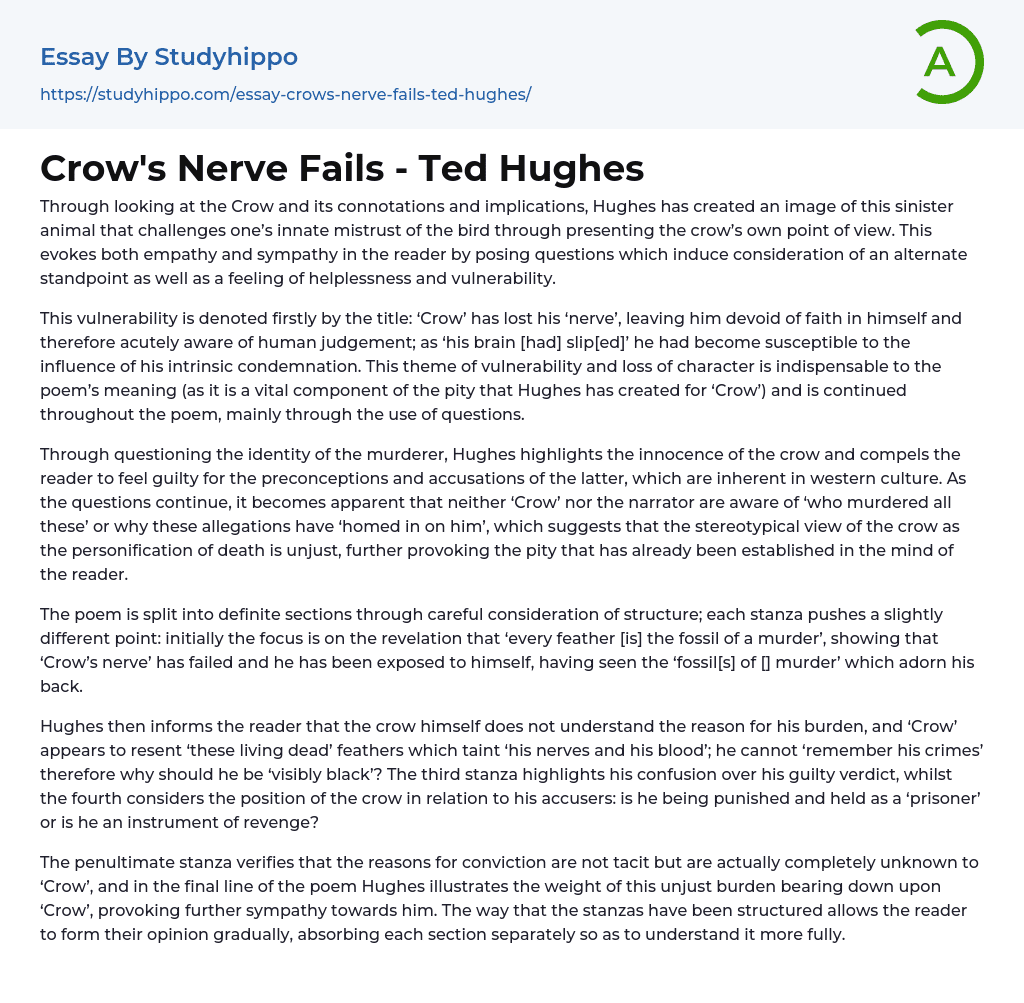Through looking at the Crow and its connotations and implications, Hughes has created an image of this sinister animal that challenges one’s innate mistrust of the bird through presenting the crow’s own point of view. This evokes both empathy and sympathy in the reader by posing questions which induce consideration of an alternate standpoint as well as a feeling of helplessness and vulnerability.
This vulnerability is denoted firstly by the title: ‘Crow’ has lost his ‘nerve’, leaving him devoid of faith in himself and therefore acutely aware of human judgement; as ‘his brain [had] slip[ed]’ he had become susceptible to the influence of his intrinsic condemnation. This theme of vulnerability and loss of character is indispensable to the poem’s meaning (as it is a vital component of the pity that Hughes has created for ‘Crow’)
...and is continued throughout the poem, mainly through the use of questions.
Through questioning the identity of the murderer, Hughes highlights the innocence of the crow and compels the reader to feel guilty for the preconceptions and accusations of the latter, which are inherent in western culture. As the questions continue, it becomes apparent that neither ‘Crow’ nor the narrator are aware of ‘who murdered all these’ or why these allegations have ‘homed in on him’, which suggests that the stereotypical view of the crow as the personification of death is unjust, further provoking the pity that has already been established in the mind of the reader.
The poem is split into definite sections through careful consideration of structure; each stanza pushes a slightly different point: initially the focus is on the revelation that ‘ever
feather [is] the fossil of a murder’, showing that ‘Crow’s nerve’ has failed and he has been exposed to himself, having seen the ‘fossil[s] of [] murder’ which adorn his back.
Hughes then informs the reader that the crow himself does not understand the reason for his burden, and ‘Crow’ appears to resent ‘these living dead’ feathers which taint ‘his nerves and his blood’; he cannot ‘remember his crimes’ therefore why should he be ‘visibly black’? The third stanza highlights his confusion over his guilty verdict, whilst the fourth considers the position of the crow in relation to his accusers: is he being punished and held as a ‘prisoner’ or is he an instrument of revenge?
The penultimate stanza verifies that the reasons for conviction are not tacit but are actually completely unknown to ‘Crow’, and in the final line of the poem Hughes illustrates the weight of this unjust burden bearing down upon ‘Crow’, provoking further sympathy towards him. The way that the stanzas have been structured allows the reader to form their opinion gradually, absorbing each section separately so as to understand it more fully.
- Kill essays
- Ambition essays
- Anger essays
- Betrayal essays
- Boredom essays
- Confidence essays
- Courage essays
- Desire essays
- Disgrace essays
- Doubt essays
- Empathy essays
- Fairness essays
- Fear essays
- Feeling essays
- Forgiveness essays
- Grief essays
- Guilt essays
- Happiness essays
- Harmony essays
- Hate essays
- Honesty essays
- Honor essays
- Hope essays
- Humanity essays
- Inspiration essays
- Kindness essays
- Laughter essays
- Loneliness essays
- Lost essays
- Loyalty essays
- Need essays
- Passion essays
- Pressure essays
- Pride essays
- Regret essays
- Respect essays
- Responsibility essays
- Sarcasm essays
- Shame essays
- Suffering essays
- Suspense essays
- Tolerance essays
- Animal Cruelty essays
- Charles Manson essays
- Crime Prevention essays
- Crime scene essays
- Criminal Justice essays
- Criminology essays
- Cyber Crime essays
- Damages essays




